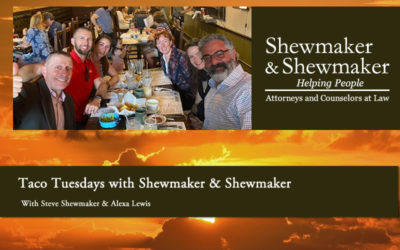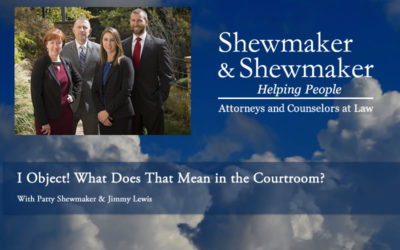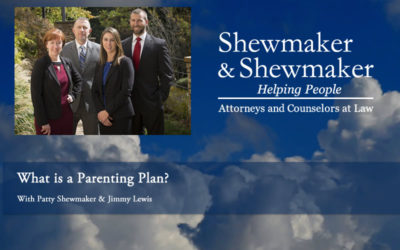Insights
At Shewmaker & Lewis, we believe that knowledge is power—especially when it comes to the law. Our Insights page is your resource for exploring a wide range of legal topics, from Family Law and Military Justice to Criminal Defense and beyond. Through our blog articles, videos, and in-depth discussions, we break down complex legal issues in a way that’s clear, practical, and relevant.
Looking for even more candid legal conversations? Be sure to check out our Podcast/Vodcast here ,where we tackle important legal topics with real talk—no billboards required.
What are the Consequences of a Temporary Protective Order (TPO) in Georgia?
In this third video in a series on Temporary Protective Orders (TPOs), Steve Shewmaker and Alexa Lewis discuss what happens after a court ordered TPO is granted. What length of time is it in effect? What are the parameters of the ruling? What if there are children involved? Are TPOs ever used as a “weapon” in a divorce proceeding?
TPOs in Georgia can stray into areas typically covered by domestic and divorce law and a judge has a great deal of latitude in their decision. This video will go over many of the potential consequences faced by the parties involved.
It is strongly advised that you have a lawyer for the full evidentiary hearing on your petition for a TPO. Contact Shewmaker & Lewis if you are seeking a TPO or facing a TPO. We’re here to help.
Temporary Protective Orders (TPOs) in Georgia. What Happens in a Hearing?
A temporary protective order (TPO) in Georgia is a civil court order providing protection to an individual until a full and fair court hearing can be held. The TPO is in place for a short time – typically 30 days or less, and is considered minimally intrusive on civil liberties. Violations of a TPO can trigger criminal charges, fines and jail time. It is strongly advised that you have a lawyer for the full evidentiary hearing on your petition for a TPO. Your attorney is not present in the judge’s chambers or courtroom for the initial application, but they can help you prepare and accompany you to the courthouse.
In this video, Steve Shewmaker and Alexa Lewis discuss what happens in a TPO and relate stories about several entertaining and eye-opening TPO hearings they’ve been involved in.
Temporary Protective Orders (TPOs) in Georgia. What Do I Need to Know?
A temporary protective order (TPO) in Georgia is a civil court order providing protection to an individual until a full and fair court hearing can be held. The TPO is in place for a short time – typically 30 days or less, and is considered minimally intrusive on civil liberties. Violations of a TPO can trigger criminal charges, fines and jail time. Your attorney is not present in the judge’s chambers or courtroom for the initial application, but they can help you prepare and accompany you to the courthouse. It is strongly advised that you have a lawyer for the full evidentiary hearing on your petition for a TPO. In this video, Steve Shewmaker and Alexa Lewis go into detail on the process of obtaining a TPO and defending against a TPO, and discuss what types of relationships and acts are covered under the statutes.
The ABA Motto is “To Stabilize and Preserve the Family.” What Does That Mean?
The American Bar Association (ABA) has a motto: “To Stabilize and preserve the Family. What does that mean for divorce lawyers? There are times when what a client wants may not be the best thing for a child and for a family. Yes, attorneys should zealously protect their client’s interests, but they also have a responsibility to set up reasonable expectations and explain how what they want could affect their family, their co-parenting relationship and their children.
Alexa Lewis and Jimmy Lewis of the Law Firm Shewmaker & Shewmaker discuss in this video.
Equal Time in Custody What Does that Look Like?
There are a number of options when establishing schedules for child custody in Georgia divorce cases. Typically, parents are awarded joint custody, meaning they share the decision making in matters regarding the children. They also have equal rights to educational and medical records. There are two types of custody – legal and physical. In this video, Alexa Lewis and Jimmy Lewis with the law firm Shewmaker & Lewis discuss physical custody and how that can look when physical custody is shared equally, including week-on week-off, 2-2-3 and 2-2-5-5 plans.
Preparing Clients for a Bench Trial versus a Jury Trial
Whether it’s a jury trial or a “judge alone” bench trial, clients or witnesses for clients should be thoroughly prepared to testify. However, there are differences in how we prepare clients for a jury trial. We may be more concerned with appearance in a Jury trial. Juries can range from four individuals in a Military Tribunal, to six in a State Court to twelve in Superior Court. They are generally not attorneys and their perceptions matter.
In this video Steve and Patty Shewmaker take a deep dive into how they prepare clients for either scenario at the law firm Shewmaker & Lewis.
What Happens if You Have Overpaid Your Child Support?
There are cases where one parent has been paying child support to the other parent and realizes they have been overpaying. This can happen in a number of situations – for instance when the child support obligation is tiered. The law is very clear on these adjustments based on Court of Appeals and Georgia Supreme Court decisions. Steve Shewmaker and Jimmy Lewis with the Shewmaker & Lewis Law Firm discuss this scenario, child support modifications and how emancipation can effect child support payments.
Taco Tuesdays with Shewmaker & Lewis
We all have our favorite movies about divorce. There are some good ones that teach us valuable lessons about divorce, the law, and how things can go very badly when relationships and marriages go south. In this video, Steve Shewmaker and Alexa Lewis with the Law Firm Shewmaker & Lewis talk about their favorite movies and the lessons we can all learn from them.
I Object! What Does That Mean in the Courtroom?
We’ve all seen countless TV shows where the lawyers are shouting “I object!” What does that actually mean? The phrase is basically an interruption to get the courts attention about something that is improper. It can be about the admissibility of testimony or evidence, or it can draw attention to an improper question. In this video, Steve and Patty Shewmaker with the law firm Shewmaker & Lewis discuss objections and the range of purposes behind an objection including “talking objections” and objections used for strategic reasons. They also touch on how important it is to prepare clients for trial so that they understand what is happening and how to conduct themselves.
What is a Parenting Plan?
Any time custody and parenting time is in dispute, which is virtually every time children are involved in a divorce, Georgia courts require a parenting plan. There must be a plan agreed to by the parties or else a plan will be ordered by a judge. In this video from the Shewmaker & Lewis Law Firm, Patty Shewmaker and Jimmy Lewis discuss custodial arrangements, physical custody and the many other factors that go into the creation of a parenting plan.












